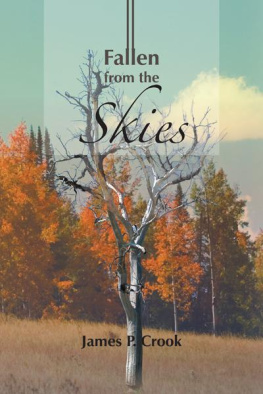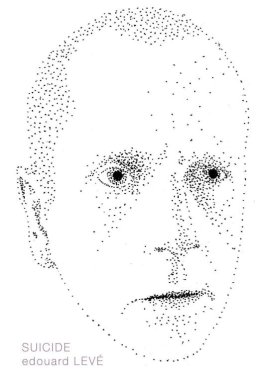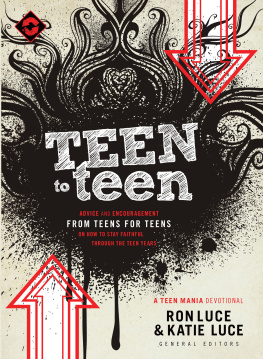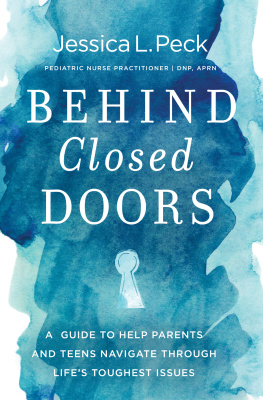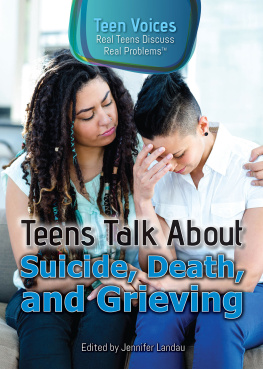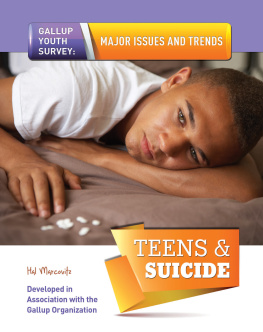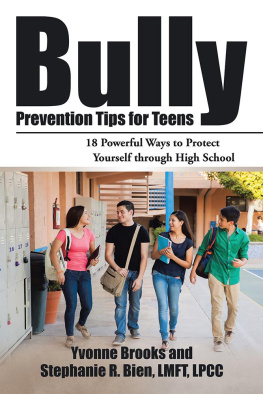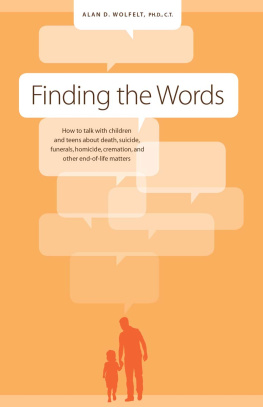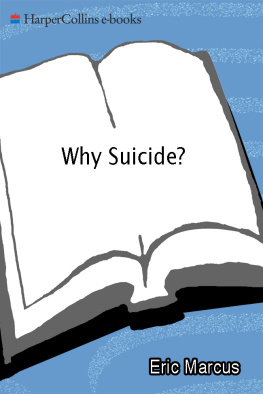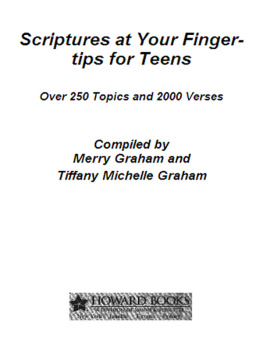Crook - Out Of The Darkness: Teens Talk About Suicide
Here you can read online Crook - Out Of The Darkness: Teens Talk About Suicide full text of the book (entire story) in english for free. Download pdf and epub, get meaning, cover and reviews about this ebook. year: 2003, publisher: Arsenal Pulp Press, genre: Politics. Description of the work, (preface) as well as reviews are available. Best literature library LitArk.com created for fans of good reading and offers a wide selection of genres:
Romance novel
Science fiction
Adventure
Detective
Science
History
Home and family
Prose
Art
Politics
Computer
Non-fiction
Religion
Business
Children
Humor
Choose a favorite category and find really read worthwhile books. Enjoy immersion in the world of imagination, feel the emotions of the characters or learn something new for yourself, make an fascinating discovery.

Out Of The Darkness: Teens Talk About Suicide: summary, description and annotation
We offer to read an annotation, description, summary or preface (depends on what the author of the book "Out Of The Darkness: Teens Talk About Suicide" wrote himself). If you haven't found the necessary information about the book — write in the comments, we will try to find it.
Crook: author's other books
Who wrote Out Of The Darkness: Teens Talk About Suicide? Find out the surname, the name of the author of the book and a list of all author's works by series.
Out Of The Darkness: Teens Talk About Suicide — read online for free the complete book (whole text) full work
Below is the text of the book, divided by pages. System saving the place of the last page read, allows you to conveniently read the book "Out Of The Darkness: Teens Talk About Suicide" online for free, without having to search again every time where you left off. Put a bookmark, and you can go to the page where you finished reading at any time.
Font size:
Interval:
Bookmark:
Out of the Darkness
TEENS AND SUICIDE
Marion Crook

OUT OF THE DARKNESS
Copyright 2003 by Marion Crook
All rights reserved. No part of this book may be reproduced or used in any form by any means
graphic, electronic or mechanicalwithout the prior written permission of the publisher, except
by a reviewer, who may use brief excerpts in a review, or in the case of photocopying in Canada, a
license from Access Copyright.
ARSENAL PULP PRESS
#102-211 East Georgia St.
Vancouver, BC
Canada V6A 1Z6
arsenalpulp.com
The publisher gratefully acknowledges the support of the Canada Council for the Arts and the
British Columbia Arts Council for its publishing program, and the Government of Canada through
the Book Publishing Industry Development Program for its publishing activities.
Book and cover design by Solo
Cover photograph by Thomas Hoeffgen/Getty Images
Printed and bound in Canada
NATIONAL LIBRARY OF CANADA
CATALOGUING IN PUBLICATION DATA:
Crook, Marion, 1941-Out of the darkness : teens talk about suicide / Marion Crook.
ISBN 1-55152-141-5
ISBN 978-1-55152-141-1
EISBN 978-1-55152-313-2
1. TeenagersSuicidal behavior. 2. SuicidePsychological aspects.
3. SuicidePrevention. 4. TeenagersInterviews. I. Title.
HV6546.C758 2003 362.28'0835 C2003-910380-3
I would like the thank all the teens who responded to my ads in the newspapers and called or met with me. They were genuine, compassionate, and committed to helping other teens. The Canadian Mental Health Association (BC Division) and the Suicide Information and Education Centre in Calgary, the Distress Centre in Toronto, and the Helpline in Halifax offered practical help and encouragement. Carol Lowe, Program Director of the Vancouver Crisis Centre, gave me much needed advice and information over the many months it took to prepare the manuscript. I would like to thank Peter Gajdis, Julie Epp, and Angela Haggerty who reviewed my questions and the chapter on suicide risk and offered invaluable advice. Jasha Ramsay, Executive Director of the Vancouver Crisis Centre, gave me initial encouragement and continual support. Thanks also to Chloe Lapp of the Canadian Mental Health Association and Gordon Winch and Ila Rutlege of the Toronto Distress Centre. Many thanks to Rhamona Von Browning of Youth Quest; Neena Tragguason of the Vancouver Women's Health Collective; Geri from the Lesbian Support Group; Heather Stenerson, Friends for Life, Saskatchewan; Sherryl Mydonick, Yorkton, Saskatchewan; Darien Simons, Vancouver Crisis Centre, who studied the book and recommended improvements; Corporal Wayne Price, Aboriginal Policing, RCMP; Rodney Louie, Lilooet Tribal Council, who offered comments and direction; and Matthew and Ashley Lindsay of Winnipeg, who gave me room and board and introduced me to their friends.
I also wish to acknowledge the Vancouver Crisis Centre; the United Church of Canada, Van Dusen Fund; and the Chris Spencer Foundation for their assistance in providing grants and encouragement for research.
The poems in this book were donated by some of the teens I interviewed. I received too many to include them all, and I wish to thank everyone who was willing to participate with their ideas, emotions, and commitment to helping others.
to Bobbie
and the many teens
who contributed to this book
Round the comer
Hide from the darkness
that follows my footsteps
that lives on my fears
Megan
Teenagers try suicide. I know they can have a difficult timeI worked as a public health nurse for a number of years and had been a resource for troubled teens, but I had never saw suicide as a problem I could do anything about. When I first became interested in researching the problem I had teenagers of my own at home and discovered that suicide was an alarming and increasing choice for many young people. I had thought myself an alert parent, teaching safe sex and safe driving habits, concerned about hitchhiking, drug and alcohol use, and the necessity of a good academic life, but I never thought about talking to my children about suicide. My understanding of teens and suicide was based on the lectures in my nursing education and the limiting and erroneous belief that suicide was usually a result of mental illness. I could see that the teens who died by suicide were not mentally ill, nor did they look much different from other teens. Still, I did nothing about my observations.
I wrote a book about how teenagers feel about being adopted (The Face in the Mirror: Teenagers and Adoption, Arsenal Pulp Press), based on research with forty teens. When the book hit the stores I received a telephone call from a woman who had read it, who knew I could write, and who wanted me to take her daughter Bobbie's diary and make a book from it.
"You're an author," she said. "Do something!"
Her daughter had kept a diary and a journal, snippets of ideas and some poems, from the time she was sixteen until the age of twenty-one, when she killed herself. The girl's brother had also comitted suicide. Their mother thought that if I could study Bobbie's written work, I might find out why and be able to help others. I said, "No, I can't do it. I'm not a psychiatrist. I don't know enough." Bobbie's mother sent me her daughter's writing anyway. She was determined. But I was similarly determined to avoid them. They remained unread on the floor of my study for months. When I moved from central British Columbia to the west coast, I took the writings with me. I had too much conscience to throw them away, but not enough to read them. They seemed to scream at me from their position on the floor, demanding attention while I tried my best to ignore them.
I finally caved in and read all Bobbie's writings. It was a very sad and moving experience, but even after that, I knew I couldn't write about Bobbie. I felt that telling only her story would not help readers much; it was simply too sad. Perhaps, I thought, other teenagers who had tried suicide and not completed it could tell me what made it seem like such a good idea, and, perhaps, those teenagers could pass on advice on what persuaded them not to try suicide again. I could write a positive book.
I still did not want to write it. It seemed such a huge undertaking. I approached the Vancouver Crisis Centre for advice. Wouldn't such a book encourage teens to try suicide? No, they told me, no one wants to talk about suicide; everyone wants to pretend that it doesn't happen, or that it happens by accident. Teens need more information. They need to know what to look for, what to beware of, and where to go. Do the work. Write the book. We're behind you.
I then went to the Canadian Mental Health Association. The executive director there told me she really wanted me to do the research and write the book, and that she and her office staff would do all they could to help me. It seemed as though there was a tremendous need; that teenagers needed a book that told them what other teens felt, what they wanted, how they coped. I'd tentatively put my foot in the water and a strong current was pulling me under.
With the assistance of the Chris Spencer Foundation, the United Church of Canada, Van Dusen Fund, the Canadian Mental Health Association (BC Division), a group of three young people in Vancouver (my advisory board), and the Distress Centre in Toronto, I started interviewing.
At first, I was afraid that the questionnaire I composed would not be good enough, that I would have to phone everyone I interviewed, months later, to ask vital questions I hadn't thought of until the research was finished. At this time I did not yet have my PhD and was a beginning researcher with many concerns about my ability. But a medical researcher who listened to my plans told me to go ahead: I was on the right track. At this point I needed a lot of encouragement.
Next pageFont size:
Interval:
Bookmark:
Similar books «Out Of The Darkness: Teens Talk About Suicide»
Look at similar books to Out Of The Darkness: Teens Talk About Suicide. We have selected literature similar in name and meaning in the hope of providing readers with more options to find new, interesting, not yet read works.
Discussion, reviews of the book Out Of The Darkness: Teens Talk About Suicide and just readers' own opinions. Leave your comments, write what you think about the work, its meaning or the main characters. Specify what exactly you liked and what you didn't like, and why you think so.


